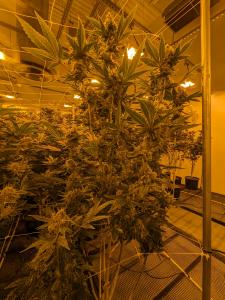
Newly introduced bill could launch Kansas’ first pilot medical cannabis program
Kansas legislature gets chance to vote on medical cannabis pilot program
Hundreds of thousands of Kansans suffer from these medical conditions, with often no treatment option other than prescription narcotics. Kansas is one of 10 states that does not currently have a medical cannabis program.
“This bill is the culmination of a thoughtful and collaborative process by legislators and industry experts to ensure that Kansas legalizes medical cannabis the right way to enact the nation’s most conservative and safe program,” said Sam Jones, Chief Operating Officer of Kansas Natural Remedies.
Kansas Natural Remedies is the state’s largest indoor hemp producer whose expertise in the industry was sought to create this bottom-up bill.
“This bill was written to comprehensively address the concerns legislators had with previous bills,” said Jones, “and to ensure that Kansas has the most conservative and controlled medical cannabis program in the nation.”
For instance, restricting the product types such as gummies & edibles, and restricting how it is distributed are big differences from other states. One key to eliminating the issues that plagued Oklahoma was to ensure that licensees are sophisticated operators capable of complying with regulations, and implementing a program that requires a close relationship between regulators and operators. This professional and clinical approach ensures that Kansas implements a safe medical cannabis program that avoids the issues plaguing other states' medical cannabis programs.
The bill does not allow many forms of consumption, such as gummies, smoking or vaping. Medicine is not administered in these forms, and this medical program avoids the safety issues to health, children and pets often linked to these forms of ingestion. Prescribed products under this program are limited to tinctures, pills/tablets, flower, ointments, and patches. All forms of delivery will be in tamper-proof, child-resistant packaging.
Medical cannabis is of special concern to military veterans, as reported by the American Legion, an advocate of medical cannabis nationally. In an independent survey of its members, 82% support legalizing medical cannabis. According to the report, 60 percent of veterans returning from combat deployments and 50 percent of older veterans suffer from chronic pain. (www.legion.org/veteranshealthcare/239814/survey-shows-veteran-households-support-research-medical-cannabis)
Medical cannabis has been shown to be effective for pain relief, helpful in stopping vomiting during chemotherapy, relieving stiffness associated with multiple sclerosis, alleviating clinically diagnosed anxiety, and alleviating symptoms of PTSD including insomnia. The drugs currently prescribed in Kansas to treat some of these illnesses include prescription opioids and sleeping pills, which carry significant side effects including overdose and death. Medical cannabis is, in many ways, a safer alternative to these prescription drugs, and Kansans should be given the medical freedom to choose these products instead of opioids and other narcotics.
Medical cannabis plugs an existing gap in pain relief options that reduces opioid prescriptions. According to a 2019 report from the Kansas Health Institute, some studies suggest that medical cannabis augments the analgesic effects of opioids, thereby allowing for a lower dose of opioids. Other studies found that states with operational networks of medical cannabis may experience a greater decrease in opioid prescribing than states without these networks.
Another key feature of the bill is that pharmacies will be the sole distributor of medical cannabis to patients. Other states' medical cannabis programs typically distribute cannabis to patients through dispensaries, which lends these supposedly medical programs the appearance of recreational use.
“It is very important that physician-ordered medication goes through a pharmacist,” said Jared Holroyd, executive director of the Kansas Pharmacists Association. “Receiving medication through a pharmacist, versus a dispensary such as in other states, gives patients a needed level of confidence in the prescription with expert answers to their questions.”
He continued, “If Kansas is to pass a true medical cannabis bill, it only makes sense that licensed pharmacists dispense to the public based on a physician’s order, as is the case with nearly all other medications. This bill does that while also not opening the door to the recreational industry, and we are therefore supportive of our inclusion in the legislation.”
Sam Jones
Kansas Natural Remedies
+1 316-650-9773
sjones@kansasnaturalremedies.com
Distribution channels: Politics
Legal Disclaimer:
EIN Presswire provides this news content "as is" without warranty of any kind. We do not accept any responsibility or liability for the accuracy, content, images, videos, licenses, completeness, legality, or reliability of the information contained in this article. If you have any complaints or copyright issues related to this article, kindly contact the author above.
Submit your press release
